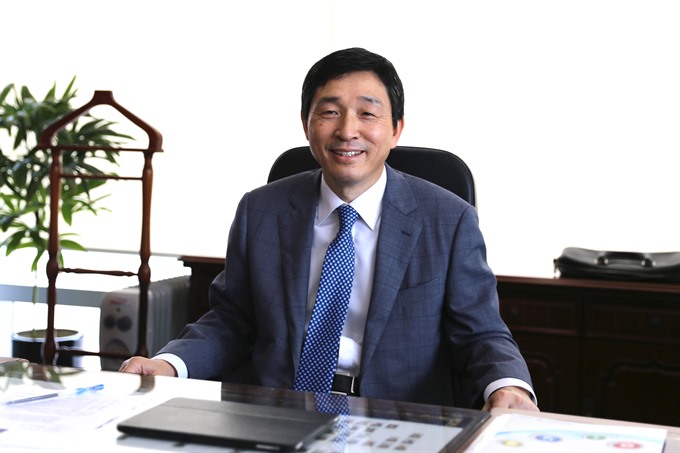 Economy
Economy

RoK Ambassador Lee Hyuk is optimistic about co-operation between Việt Nam and Republic of Korea.
-696251550PM.jpg) |
RoK Ambassador to Việt Nam, Lee Hyuk, tells Việt Nam News that bilateral relations have developed rapidly because of mutual trust and efforts by the Vietnamese Government to improve the investment environment.
 |
| RoK Ambassador Lee Hyuk. — Photo courtesy of the embassy |
Việt Nam and the Republic of Korea (RoK) are celebrating 25 years of diplomatic relations. Can you share with us your reflections on the growth in bilateral ties over this period?
Our bilateral relations have enjoyed rapid development in a very short period of time.
In less than two decades after establishing diplomatic ties, we upgraded our relationship from a “Comprehensive Co-operative Partnership” in 2001 to a “Strategic Co-operative Partnership” in 2009. We have also maintained close co-operation in regional as well as international arenas such as APEC, ASEAN-Korea, Korea-Mekong co-operation, and ASEAN+ channels.
In my opinion, it is the affinity and trust between the two nations that share historical and cultural similarities that have laid the foundation for such rapid growth in our relations.
The VKFTA (Việt Nam-Korea Free Trade Agreement), which took effect at the end of 2015, has contributed to the significant rise in the bilateral trading volumes from US$36.5 billion in 2015 to over $50 billion as of October 2017. It is clear that the agreement has had a positive influence on bilateral trade and on RoK’s investment in Việt Nam.
President Moon Jae-in and President Trần Đại Quang met at the recent APEC Summit. They agreed to further develop the strategic partnership and aim at a two-way trade of US$100 billion by 2020. How can this target be achieved?
The trade volume between our countries has increased almost 100 times, from a mere $0.5 billion in 1992 when we established diplomatic relations to over $50 billion as of October in 2017.
The RoK-Việt Nam FTA has powerfully spurred an increase in our bilateral trade volume, which is cautiously forecasted to hit the $60 billion mark this year. Yes, our leaders agreed in a bilateral meeting on the sidelines of the APEC Summit on the goal of increasing two-way trade to $100 billion by 2020. In my opinion, the goal is certainly achievable if the two countries’ governments and enterprises redouble our efforts.
In this regard, the Vietnamese Government should further improve investment environment, expand overall infrastructure and explore new trade items like consumer goods.
It’s also essential for the two governments to remove non-tariff barriers like customs clearance procedures, technical regulations, etc. There is also a need for Việt Nam to diversify and expand export goods in order to reduce its high trade deficit with Korea.
The Vietnamese Government has stated its determination to be proactive in serving people and businesses, including foreign investors. In the first ten months of the year, foreign investment in Việt Nam was $28.24 billion, including $7.62 billion from Korea. What is your view on efforts made by the Vietnamese Government to develop the economy?
I highly appreciate the great efforts made by the Vietnamese Government and people in supporting Korean enterprises advance into the Vietnamese market. I think the fact that total Korean Foreign Direct Investment (FDI) already amounts to $57.1 billion and is expected to reach $60 billion by the end of this year shows that Việt Nam is the most attractive and preferred investment destination.
Việt Nam has many comparative advantages to attract foreign investors, such as socio-political stability and low-cost human resources. The Vietnamese Government has been working hard on restructuring the economy and its growth model. It has also created a fair and attractive investment environment for foreign investors and improved its legal framework and institutions for investment.
While the majority of RoK’s investments were focused on manufacturing industries in the past, there is a growing shift towards investment in hi-tech areas recently.
In fact, the hi-tech industry is expected to attract more investment from RoK in the years to come, which goes along with the Vietnamese Government’s target of high quality FDI inflows. It is expected that more RoK investment will flow into hi-tech agriculture, marketing, sales and distribution, and banking sectors in the years to come.
Among difficulties faced by Korean enterprises in Việt Nam, the most highlighted ones are complicated resolutions relating to investment, taxes and workers. How do you think these can be addressed? Are there other difficulties that Korean enterprises in Việt Nam face?
In my opinion, there is still room for the Vietnamese Government to improve procedures related to customs clearance, taxation, administration, inspection and human resources to strengthen its investment environment.
In particular, we would recommend the removal of obstacles in production and trade activities. These have to do with business licensing, taxes and tariffs, limits on overtime working hours, work permit requirements, minimum wage increases and equal incentives for SMEs. — VNS




